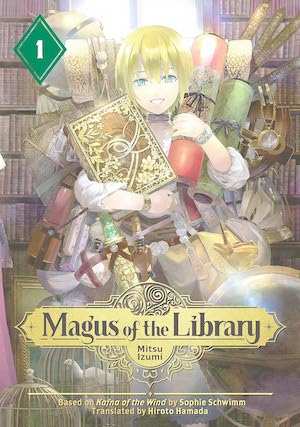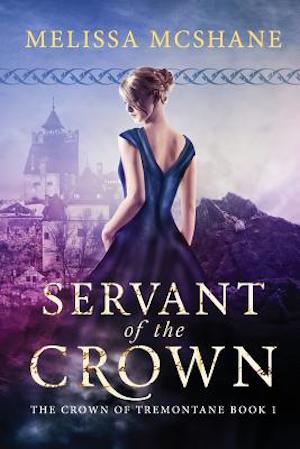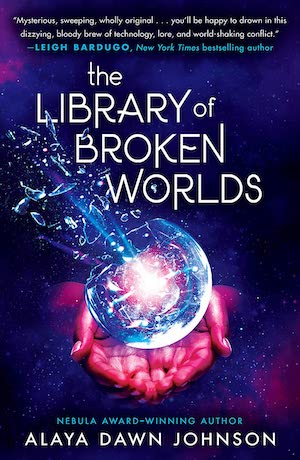A while ago I witnessed a moment of magic: a bookish child encountering the Kitchener Public Library for the first time.1 This may have been his first glimpse of a library. He wavered between joy and complete paralysis as he tried to decide which books to sign out first.
Many speculative fiction authors being bookish sorts, it’s not surprising that libraries figure prominently in many SFF works. Consider these five examples.…
Sundiver by David Brin (1980)

Humans are newcomers to an ancient Galactic civilization in which elder races raise less intelligent species to superior intelligence. The patron-client relationship is immutable. Humans claim to have evolved to technological competence without any such uplift. If this is true, it would put the basis of Galactic civilization in question. If it isn’t true, then human intelligence is evidence of a grave infraction; humans must have been abandoned by an erring older species. Human existence is a scandal; humans are fortunate that so far the Galactics have not found any excuse to expunge them from existence.
Of course, the Galactics would claim that their efforts to bring humans in line with billion-year-old convention are entirely benevolent.
Now the humans are engaged in a project that is equivalent to poking a stick in the elder species’ optical apparatus. The humans want to send a crewed mission to the Sun. The Galactic Library, repository of a billion years of knowledge, could tell humans all about sun and previous missions into suns. Or perhaps just a lot about suns (the plasma beings in our sun appear to be a surprise to the Galactics). The library is clearly not complete. The library might also be censored. The uppity humans would prefer to solve this daunting technical challenge with their indigenous technology. It’s a bold strategy, one that might invite lethal criticism from the galaxy’s more doctrinaire civilizations.
A word of warning: Sundiver is structured in such a way that readers may well be given the impression it is the sequel to an earlier work. That is not the case. This was, as far as I can tell, Brin’s debut novel.
Magus of the Library, Volume 1 by Mitsu Izumi (2018)

The great continent hosts a diverse multitude of cultures. There is a single credo that the various nations hold in common: profound distrust and dislike of anyone not like them. Impoverished half-Haupi Theo is therefore despised by his fellow villagers. This is particularly vexing where the town library is concerned, as the librarian deems bookish Theo too low-class to be permitted access to the stacks.
Fortune smiles on Theo. A visiting Great Library functionary, Seodona, inspires Theo to hope for work at the distant (and more open-minded) Great Library. Furthermore, by mishandling a damaged grimoire, the local librarian provides Theo with an opportunity to endear himself to a haughty official by saving the official’s life…an opportunity that could kill Theo if he isn’t lucky.
While the author acknowledges that some books are dangerous for entirely mundane reasons—a perfectly non-magical book inspired a genocide—other books, if mishandled, can have magical consequences. Librarians must, to a certain extent, be magicians. Will Theo’s limited magical talents be enough to qualify him for library training?
Izumi’s lavish, detailed illustrations of books and libraries make it clear that the author holds books and libraries in high regard. As one should.
Servant of the Crown by Melissa McShane (2018)

Alison Quinn, Countess of Waxwold, is summoned from her comfortable bookish life to be a lady-in-waiting to the dowager consort, the queen’s mother. The duty is as unavoidable as it is unwelcome. The new lady-in-waiting attracts the unwanted attention of Prince Anthony North. Alison sees him only as a bothersome cad and turns to the Royal Library for solace.
She finds corruption at the library and exposes the Royal Librarian as a thief. Alison is rewarded with the task of setting the library to rights. Alison’s elevation is an affront to the Scholia Masters, the ones who traditionally control the Royal Library, the colleges, and the royal bureaucracy. The Scholia Masters do not share power. This makes Alison a threat to be managed (or even better, eliminated entirely).
While the romance plot is unsurprising, McShane’s view of library science is far more blood-spattered and body-strewn than is the norm. The Scholia Masters heed the old adage that violence is the last resort of the incompetent by choosing violence as an early resort.
Bond and Book: The Devotion of The Surgery Room by Mizuki Nomura (2020)2

Books speak to high school student Musubu Enoki… literally. The books in his school library gossip incessantly, which presents Musubu with a dilemma. How can Musubu put a stop to history teacher Mr. Takekawa, who is sexually harassing schoolgirls, if Musubu cannot explain how he knows what he knows. Saying that “a book told me” would immediately undermine his credibility.
Returning a lost Pippi Longstocking book to its owner seems more straightforward. The owner, Hana, is a schoolmate. The catch? While the text yearns to be reunited with Hana, to Hana the volume is a reminder of a particularly unpleasant time in her life. Changing Hana’s mind on this matter appears impossible.
One of the useful lessons Musubu learns in the course of this work is that he does not have to solve problems on his own. Hana, for example, has her own bold scheme to deal with Takekawa. Another useful lesson is that one should avoid romantic entanglements with pathologically jealous persons, such as Princess Yonaga. The consequences are unpleasant, even though the princess has limited ability to lash out. After all, she’s only a book.
The Library of Broken Worlds by Alaya Dawn Johnson (2023)

Despite being a divine foundling, spun up out of genetic information by the eighth god, Iemaja, Freida’s ambitions are surprisingly humble. Freida yearns to join the ranks of the librarians, to prove herself worthy to curate humanity’s accumulated knowledge and preserve the peace.
To her foster parent Nadi, Freida is a person to be raised and loved like any other. To Nadi’s rival, librarian Quinn, Freida is a tool to be treasured only to the extent she is useful to the Library. Should Freida prove useless (or arguably worse, useful to Quinn’s opponents), then Quinn will have a reason to eliminate the all-too-mortal Freida.
This book points out that those who control library accession and preservation can thus shape consensus history and even the definition of commonplace words like “peace.” Efforts to expand the breadth of the library materials may be interpreted as attacks on the status quo.
SFF features many libraries, of which this is a very small sample—I didn’t even touch on Ponginae-dependent libraries.3 Perhaps your favourite examples were omitted. Feel free to regale us with them in comments below.
- For rural kids attending two-room schools with tiny libraries (libraries that a determined reader could read through in a couple of months), visits from well-stocked bookmobiles (a truck or bus containing a library) were treasures up there with anything Sinbad discovered. Bookmobiles (or the equivalent) don’t figure largely in SFF, but I know of one novel with such: Sarah Gailey’s Upright Women Wanted. There are probably others I am overlooking. ↩︎
- The title references Kyōka Izumi’s Meiji-era story “The Surgery Room.” ↩︎
- Libraries can be used to research unfamiliar terms like Ponginae. ↩︎










